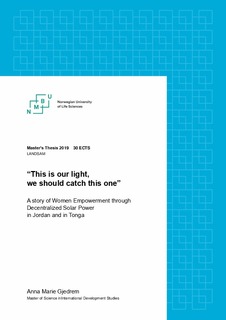| dc.description.abstract | Women across the globe are limited by barrier-restricting opportunities for their self-development, the right over her body, control over her integrity, and access to her human rights. Addressing and undertaking women empowerment fosters their capabilities, enables development and social justice. The Barefoot College (BC), situated in Tilonia, Rajasthan, India, aims to empower women by training them as Solar-Panel Engineers (Barefoot Solar Engineers (BSE)) in the college’s International Solar Training (IST) Program. This thesis analyzes how the IST affects the BSEs’ empowerment in Jordan and in Tonga. In addition, it examines how the BSEs’ agency, and the structures and relations surrounding the BSEs are facilitating or limiting the BSEs’ empowerment process in Jordan and in Tonga. This qualitative research is based on six in-depth interviews; including two Jordanian BSEs, two Tongan BSE, one Jordanian Ground Partner, and one Tongan Ground Partner; five Jordanian interviews and four Tongan interviews with people involved with the IST program; and two Jordanian and nine Tongan key informants. These interviews permitted a broader analysis of the structures and relations that surround the BSEs; the BSEs’ agency; a base to examine how the IST Program was facilitated and carried out in Tonga and in Jordan; and an insight into how the respective IST Program affect the Jordanian and Tongan BSEs’ empowerment processes. The semi-structured interviews were carried out through an ethnographic approach and a conceptual approach. The Ethnographic approach provides space for program-based, communities’ and BSEs’ Perspectives and objectives. The conceptual framework that was used to analyze the results is based on CARE’s Women’s Empowerment Framework. The three Perspectives (i.e. program-based, community and women/BSEs’) and the two sites (i.e. Jordan and Tonga) of the study highlight the contextual importance of woman empowerment. This study found that the IST program had limited effects on women empowerment regarding economic independence and sustainability. However, the respective IST programs facilitated increased opportunities for income-work, mobility, skills attainment and augmented self-esteem, which have been of great importance to the BSEs’ empowerment process. | nb_NO |

